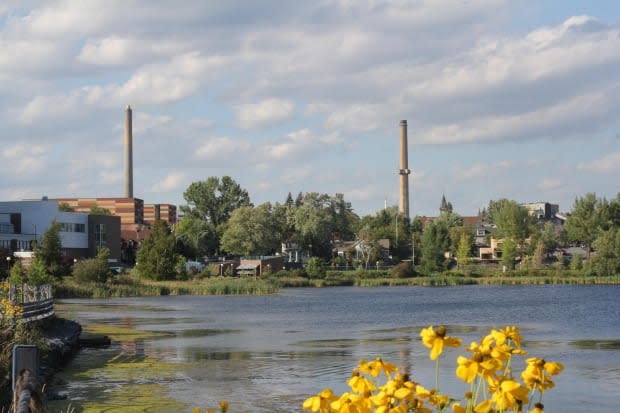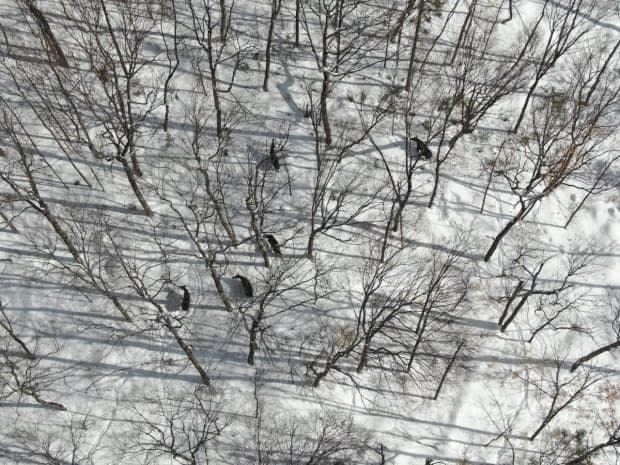Anishinaabe communities feel 'kept in the dark' about arsenic emissions from Horne Smelter

Steeve Mathias has a lot of questions about the impact of the Horne Smelter on surrounding Anishinaabe communities.
The former chief of Long Point First Nation questions how far the western Quebec copper smelter's emissions spread across the territory.
And he wonders if his people can safely eat the meat hunted on the land, and consume collected plants and berries.
His overarching question: "[Is it] harmful to the health of our people?"
He's yet to hear a satisfying answer.
Mathias is a spokesperson for the Chiefs and Councils of Long Point First Nation, Kebaowek First Nation and Timiskaming First Nation on this issue.
Last week, their leaders in the Abitibi issued a press release on the need for their communities to be consulted when it comes to the future of the smelter.
They say there isn't enough communication between them, the province and the smelter as they face a possible threat to their traditional ways of life.
Built in 1926 and owned by Glencore Canada, the smelter has been making headlines due to arsenic emissions that are 33 times the provincial standard.

The smelter is exempted from following that standard — Quebec allows it to instead take a gradual approach to reducing emissions.
In June, a study by Quebec's institute of public health (INSPQ) confirmed higher rates of cancer and pulmonary diseases in the city of Rouyn-Noranda are directly linked to high arsenic and cadmium emissions from the nearby smelter.
These findings are part of what inspired the Anishinaabe communities to act, says Mathias.
Grand Chief of the Algonquin Anishinabeg Nation, Savanna McGregor, as well as chiefs from Long Point First Nation, Kebaowek First Nation and Timiskaming First Nation, have written to Premier François Legault, asking the province to act.
Need for certainty
Mathias says communities have been getting mixed signals. While some were issued health advisories, others — closer to the smelter — were not.
"We need to have some certainty on what's going on," he said. "Why are we kept in the dark? Why are we not being provided that type of information?"
Mathias notes that his community is being more careful, with experienced elders looking over meat to see if there are any visible signs of contamination. Other communities are looking into doing their own testing.

'The land doesn't speak'
McGregor says the community "can only imagine" what contaminants they have already been exposed to in the near century the smelter has operated.

"There's a big concern in regards to arsenic leaching out and then going downstream and affecting us all," she said.
"The land doesn't speak. So here we are trying to make sure that we do get accommodation and consultation that is appropriate."
She says traditional activities have already been threatened by uranium contamination in the water supply of her community of Kitigan Zibi.
"Who are we if we can't practice our traditional customs on our territory, right?" said McGregor.
It's a worry for Jerry Polson, an Anishinaabe elder and the director of culture, language, sports and recreation at the Long Point First Nation.
He says there are a number of factors which have contributed to the decline in traditional ways of life, with pollution being a major cause. He says when it comes to the smelter, they need more information to move forward.
"It would be nice to know exactly what's happening with the environment in the region and the plans that the mines have," said Polson, adding that the community wants to do its own environmental assessments.
LISTEN | Steeve Mathias talks about the Horne Smelter:
"We depend a lot on the wildlife, the fauna and flora, that's who we are as Anishinaabe people. We eat fish on the regular basis, we hunt and trap. So we cannot live only on what you can buy in the grocery stores," said Mathias.
He now worries the smelter could be causing "irreparable harm" to that lifestyle.
Extent of health risk unknown
The concern among community members is appropriate, says Koren Mann, professor and chair of pharmacology and therapeutics at McGill University. She has a specialization in metal toxicology, the immune system and cancer.
She says not only is arsenic linked to certain types of cancers, but it's also linked at lower concentrations to cardiovascular and pulmonary diseases, and changes in the immune system.
"Their traditional habits are localized," she said. "So they're basically eating what's in their environment."
"We need to understand what these exposures are.… There's more and more evidence that what these metals do affect multiple generations."
Request for 'meaningful consultation'
Mathias says the rights of the Anishinaabe were ignored.
"We reached out to Glencore and the Ministry of the Environment and the Fight Against Climate Change but they're not giving us anything serious," said Mathias.
He says the only thing offered to them was to attend an online meeting or the public consultations in Rouyn-Noranda.
Mathias said legal advisors told them this offer did not amount to meaningful consultation.
He says without a "meaningful" response from the government, they will consider pursuing legal action.

In a written statement, Environment Minister Benoît Charette says the concerns of the Indigenous communities in the region are "legitimate."
"The [minister] is already committed to continuing to engage with stakeholders concerned about public health issues and the potential impacts of the Horne Smelter," reads the statement.
Glencore Canada declined CBC's request for an interview.


